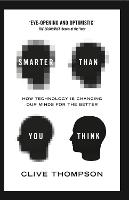


|
|
| book details |
Smarter Than You Think: How Technology is Changing Our Minds for the Better
By (author) Clive Thompson

|
This book is currently unavailable. Enquire to check if we can source a used copy
|
| book description |
From the ‘Wired’ and ‘New York Times Magazine’ contributor, a brilliant examination into how the internet is profoundly changing the way we think. In this groundbreaking book, Clive Thompson argues that the internet is boosting our brainpower, encouraging new ways of thinking, and making us more – not less – intelligent as is so often claimed. Our lives have been changed irrevocably by the rise of the internet. But as we rely more and more on machines to help us think, our thinking is becoming richer and more complex. We learn more, retain it longer, write in curious new forms, and even think entirely new types of thoughts. ‘Smarter Than You Think’ is filled with stories of people who are using technology to boost their brains. Meet the ageing millionaire who is saving a digital copy of everything that happens to him, the leading artificial-intelligence researcher who is creating software that will sense your mood and many other fascinating characters who are reaching new heights with digital help. Lucidly written and argued, ‘Smarter Than You Think’ is a breathtaking original look at our Brave New World.
| product details |
Normally shipped |
Publisher | HarperCollins Publishers
Published date | 12 Sep 2013
Language |
Format | Digital download
Pages | 352
Dimensions | 0 x 0 x 0mm (L x W x H)
Weight | 0g
ISBN | 978-0-0074-2778-9
Readership Age |
BISAC | technology / social aspects
| other options |
|
|
|
To view the items in your trolley please sign in.
| sign in |
|
|
|
| specials |
|
|
|

|
Mason Coile
Paperback / softback
224 pages
was: R 520.95
now: R 468.95
|
A terrifying locked-room mystery set in a remote outpost on Mars.
|
An epic love story with the pulse of a thriller that asks: what would you risk for a second chance at first love?
|
|
|
|